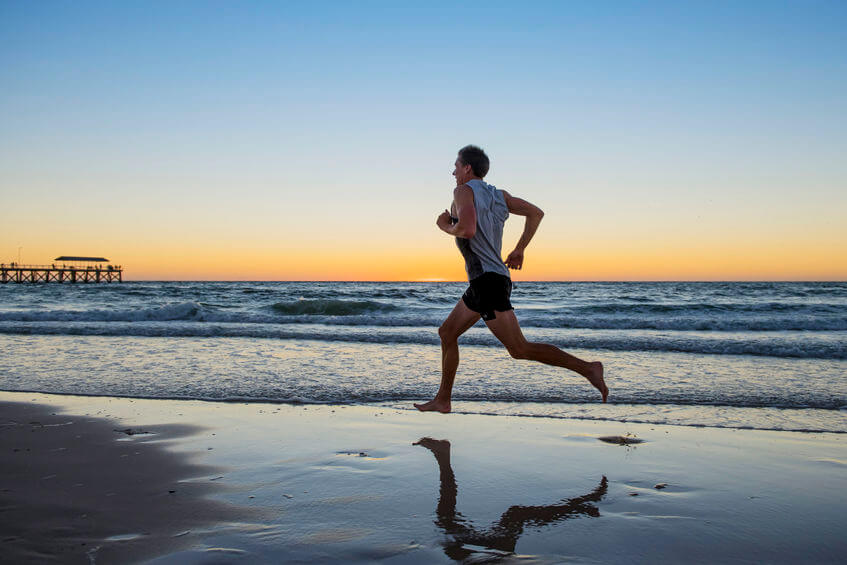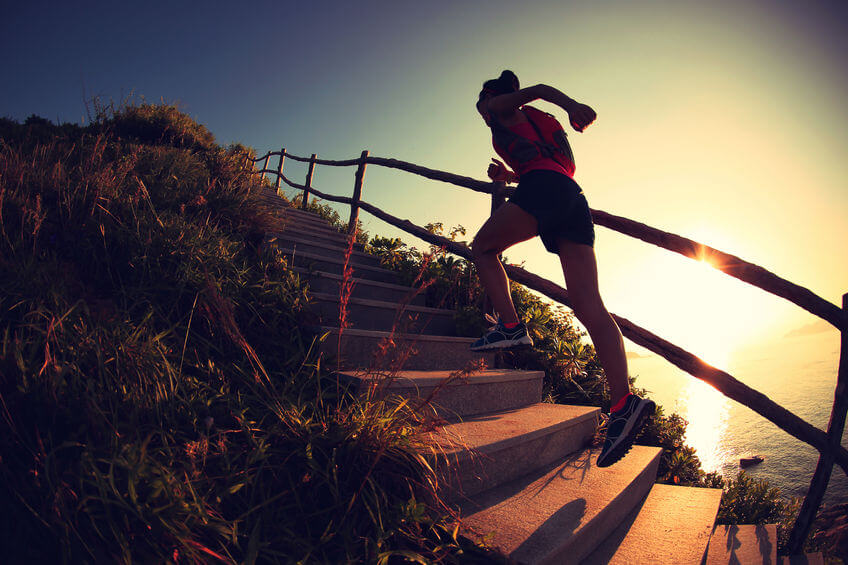Running in the Morning vs. Afternoon vs. Evening – When is the Best Time to Run?
An age-old question that has been debated for years, “when is the best time to run?” is still one of the most commonly asked and discussed running related queries out there.
Is there a specific time of day that is best for running?
If so, what is it?
Like many things in life, there isn’t really a “one size fits all” answer.
There are many variables involved in finding a definitive answer to this question including personal factors (work schedule, meal schedule, family commitments) as well as more scientific factors such as the inner workings of various bodily functions related to running and mental/psychological processes.
The best thing to do is to look at the question from all sides – having a lot of information when trying to make a choice is never a bad thing!
Let’s start by taking an in-depth look at the things to consider when deciding if it is better to run in the morning or evening.
Contents
What are the Benefits of Running in the Morning?
Is it better to run in the morning?
From a purely physiological sense, running before 10-11 AM certainly isn’t the best option.
Virtually every major physical process that is occurring within the body during a run is at its weakest/worst statistical level of the entire day during the early and mid-morning.
This can cause several different complications that may negatively influence performance.
First of all, our bodies are coming out of a 6-10 hour fast (time spent asleep during the night). Without a substantial pre-run meal, energy levels are likely to be low.
If you don’t have time to wait for your power breakfast to digest due to work or family obligations, stomach problems may also occur.
Body temperature will also be extremely low at this time of day, which means muscles in the legs, arms, and chest may feel quite stiff. This means that the chances of suffering an injury at this time of time are greater than the odds of the same injury happening during a run that takes place in the afternoon or evening.
However, there certainly still are some positives to avoiding the snooze button and lacing up your running shoes just after sunrise.
Testosterone levels tend to peak in the morning, which makes building muscle a little bit easier than at other times during the day.
There are also certainly a lot of mental and/or psychological benefits of a morning run immediately after waking up. The sheer mental discipline required to stay dedicated to your routine and continually pass up on sleeping in develops a ton of mental strength.
It’s often common to strive for training runs that feel easy and effortless due to seeking solely a performance-based goal (personal best, fastest mile, etc.).
However, inner fortitude is mostly developed during times of extreme discomfort.
So while getting extra sleep may sound extremely tempting, pushing your body to the limit first thing in the morning will certainly reap huge psychological benefits.
The last major benefit of a morning run revolves around consistency – studies have found that runners who commit to running in the morning tend to follow through more than those who plan to exercise later in the day.
This is most likely due to two factors:
- We are at our freshest, mentally speaking, first thing in the morning – this makes it easier to have a positive mindset and keep the commitments we have made to ourselves, especially if we are waking up early for the sole purpose of running.
- Outside commitments tend to pop up more in the afternoon/evening. In other words, if we put off running in the morning, there are so many things that can disrupt our plan to run later in the day. However, if we finish our run within the first few hours of waking up, we have avoided the many various pitfalls that could have potentially sidetracked our plan to exercise.
What are the Benefits of Running in the Afternoon?
While many physical functions are slowly starting to reach more efficient or optimal levels of function as the day progresses into early afternoon, the body still isn’t in peak running condition just yet.
However, the process of eating and digesting 1-2 meals by this time ensure relatively high energy levels.
Lung performance and body temperature also experience a bit of a downturn during 12-2 PM, which limits the likelihood of running in a peak performance window.
For those who work a 9-5 job, running in the afternoon does seem to help work performance for the rest of the day. The physical activity and ensuing rush of endorphins certainly have an uplifting impact once you get back to the office. You’ll certainly feel more focused and energetic during the last few hours of the workday.
However, once we hit late afternoon, we enter a prime performance window. This is the time of day when our body really shifts into top gear – lung performance and body temperature are simultaneously at peak levels.
If you are chasing a personal best, this is definitely the best time to run – at least scientifically speaking.
All systems are firing on all cylinders. Optimal physical conditions are most definitely in place to help you burn through mile after mile at a quick pace.
It is important to note that this may be a difficult window to run in on a purely psychological level – especially if you have had a long day at work. Despite your body being ready physically, your mental state may be negatively affected by a lack of motivation or general apathy.
It is often times much easier to head out for a run when we are wide-awake in the morning than after a long, mentally grueling day at work.
So, the best time to go for a run is certainly dependent on whether or not you are chasing performance-based goals or just seeking mental clarity/improvement on a consistent basis.
What are the Benefits of Running in the Evening?
The benefits of evening running are also largely dependent on what exact time the run starts.
While late afternoon seems to be the peak physical time for best running performance, this window seems to stretch until almost 7 PM at night.
So, the early evening is also an optimal time to head out for a run -assuming you have properly fueled your body throughout the day.
Reaction time, aerobic capacity, and body temperature are all still at impressive levels at this particular time of day, which definitely leads to better results in terms of speed and injury prevention.
After 7 PM, body temperature and lung performance start to dip. We also tend to be much more mentally tired in the evening, especially after a long day of work and social interaction.
However, running later in the day also has some important ramifications – especially relating to sleep. A run just before bed can help you blow off some steam after a long day.
Despite an elevated heartbeat upon, overall sleep quality seems to remain unaffected by running after the sun goes down.
This is contrary to the popular belief that running later at night impacts sleep quality in a negative manner – this appears to not be the case, although some people still may find running earlier in the day helps them get to sleep quicker.
Is There REALLY the Best Time of the Day to Run?
As you can see, there are clearly so many different factors to consider when debating running in the morning vs. evening.
It really boils down to individual preference and balancing performance-based goals with the rest of your work, family, and social life.
Whatever time will allow you to run on the most consistent basis is likely the best place to start.
Why run in the morning?
Maybe you have a hectic 9-5 job and/or a family life that doesn’t allow you to run in the afternoon or evening.
Perhaps it is easier for you to commit and stick to a running plan if you just get it out of the way first thing after waking up.
It might even be because of the added physical challenge of testing yourself when your body isn’t at its best in terms of physiological processing.
Exposure to the natural light first thing in the morning can also help set a positive tone for the rest of the day, especially after the release of endorphins post-run.
Whatever the reason, there are certainly many noteworthy benefits.
How about the afternoon?
Having the ability to take a break from a long workday to work up a sweat has numerous positive effects.
You may also find yourself much more efficient for the rest of the day while also maintaining a more upbeat attitude and a stress-free mindset.
The body also peaks at this time, so if you are only worried about performing the best each and every time you head out for a run, this is likely the best time slot to do so.
Maybe go for an evening run?
People who are in search of the benefits of evening running tend to need an outlet to mentally reset or unwind at the end of a long day.
Although the body may not quite be at its physical peak as it prepares for another night of sleep, it still is in fairly optimal shape up until 7 PM.
Remember to give yourself plenty of time to digest your evening meal before heading out if you eat prior to leaving, or before you go to bed if you eat upon completion of your run.
Are You Running Towards a Race Day?
It is also important to note that if you are training for a marathon, triathlon, or any other specific event, it is most beneficial to run at the same time of day that the race itself will take place.
This will allow your body to adjust and get used to performing at the same over an extended period of time.
Our body functions differently depending on what time of day running takes place – if we take time to get used to running at a specific time, the big day should feel no different than any other run.
Training that way will ensure that you are at your absolute best, both physically AND mentally, for the race day.
At the end of the day, your circadian rhythm (the daily cycle that regulates bodily functions such as blood pressure, temperature, metabolism, etc.) can slowly shift to accommodate whatever running time works best for you and your schedule.
Although your body takes several weeks to get used to a new routine, it usually settles in after around a month.
Once you get accustomed to the same routine on a daily basis, the mental and physical requirements to perform optimally during a run tend to fall nicely into place.
While running at certain times will always have certain benefits that other times may not, it truly does come down to looking at your individual lifestyle, schedule preference, and training goals.
Summary
I hope you found a lot of useful information in this article – finding the best time to run is a deeply personal question that doesn’t necessarily have one specific answer.
Running in the morning vs. evening isn’t as important as finding a way to run on a consistent basis. No matter when you run, finding ways to fit exercise into your daily routine will always be the most important issue.
The best time to go for a run is whenever you can fit one in.
Unless you are a professional athlete or have an extremely rigid schedule, this time will likely vary slightly.
Remember that running in the morning is worse in terms of physical performance but better in terms of mental performance – and that the reverse is true later in the day.
Please feel free to leave a comment below with any questions or thoughts about your experiences running at different times throughout the day – I always love to hear from our readers!
Our newsletter is also a great source of information, so subscribe today in order to get notified whenever new content gets posted to the site.






